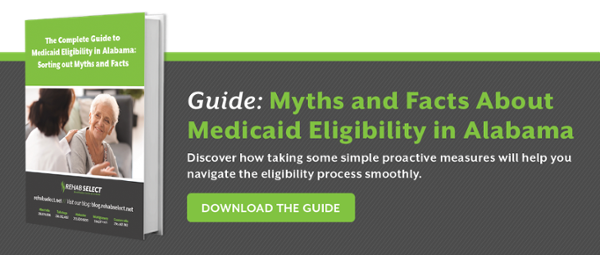
This is the third of a four-part series exploring how to navigate the complex landscape of Medicaid eligibility effectively. See the other blogs here:
- Part One: Preparing Medicaid Documents Doesn’t Have to be a Nightmare — Follow this Checklist
- Part Two: Property Ownership and Medicaid: Common Myths Debunked
- Part Four: Meet Medicaid Timelines: 13 Tips You Can’t Afford to Miss
Applying for Medicaid can be a daunting task. What makes it even more challenging are the rampant misconceptions about Medicaid eligibility, which create confusion and, in some instances, can discourage families from getting the care their loved one truly needs.
We sat down with Rehab Select’s Medicaid expert, Karen Golson, to clear things up. For instance, you might be wondering if there are exceptions to the income limit for eligibility, whether you can give money to your children, or whether your privacy is at stake when you apply for Medicaid. With over two decades of experience working within the Medicaid system, Golson understands precisely which misconceptions need to be debunked.
Gaining clarity is the first step. Let’s get started.
Myth #1: The administering agency can access your personal financial records.
Answer: True and false.
Your personal bank statements can’t be accessed, but information about your finances can be obtained. Administering agencies, like the Alabama Medicaid Agency, have an asset verification system (AVS) that uses the client or spouse’s Social Security number to pull information on any bank account they have had in the past five years, including the balance.
The agency will request that the client verify the balance on each account. If the client does not verify the information, then the balance obtained from the asset verification system will be used to determine eligibility. If the AVS finds that your loved one has $2,000 in a bank account, then it will use that number unless you can verify that it’s different.
Administering agencies also conduct property checks using deeds, which are public records. The agency will inform you about any properties they have found through the property check.
Myth #2: You can easily withhold information from Medicaid agencies.
Answer: False.
It’s never a good idea to withhold information when applying for Medicaid because the agencies have ways to verify your income and assets. Withholding information is one of the most common reasons for a denial of benefits.
People often feel like they have to be “broke” in order to qualify for Medicaid. This leads some to withhold information for a variety of reasons. They may be trying to protect their money so they can leave something for their children or grandchildren, or leave enough money for the family to spend on daily expenses. They may have a mortgage. For some people, an obscure source of income may simply slip their mind. Others are dishonest for their own gain.
In Alabama, Medicaid eligibility is more limited than in many other states because Alabama has chosen not to expand Medicaid under the Affordable Care Act. As a result, the program covers fewer adults and has stricter eligibility rules, particularly for people who are not elderly or disabled. Many low-income adults fall into what’s known as the “coverage gap,” meaning they earn too little to qualify for marketplace subsidies but do not meet Alabama’s Medicaid eligibility requirements.
While federal matching funds still pay for the majority of Alabama’s Medicaid costs, state policy decisions play a significant role in determining who qualifies and how accessible coverage is. Even so, qualifying for Medicaid does not mean patients must give up everything they own. In Alabama, certain income protections, asset exemptions, and planning tools are allowed that can help individuals receive care while preserving limited resources.
Myth #3: If your loved one earns more than the monthly income limit, they won’t qualify for Medicaid.
Answer: False.
Even if a nursing home applicant’s income exceeds Alabama’s Medicaid income limit, they may still qualify by using a qualified income trust (QIT), sometimes called a “Miller Trust.”
Alabama allows applicants whose income is above the limit to deposit excess income into a QIT. The trust must be irrevocable and used only for income — assets such as savings accounts, CDs, or IRAs cannot be placed into the trust. Income must be deposited into the QIT in the same month it’s received in order to remain compliant.
Common types of income that may be deposited into a QIT include:
- Social Security benefits (including lump sums)
- Private, federal, or military pensions
- VA lump sum payments
- Annual or periodic lump-sum payments
- Union or industry benefits, such as United Mine Workers or Black lung payments
Funds held in the QIT can only be used for approved expenses, like the Medicaid recipient’s share of care costs, health insurance premiums, and certain medical expenses. When the recipient passes away, any remaining funds in the trust may be subject to Medicaid recovery, as required by Alabama law.
Because QITs must be set up and administered correctly, even small mistakes can result in a denial or delay of benefits.
Myth #4: All of your assets will be counted to determine Medicaid eligibility.
Answer: False.
Not all assets are counted when determining Medicaid eligibility. In Alabama, certain assets can be excluded or treated differently, and in some situations, individuals may use irrevocable trusts as part of long-term care planning.
Assets placed into an irrevocable trust are no longer owned directly by the Medicaid applicant, which means they may not be considered a countable resource — provided the trust is created and administered in compliance with Medicaid rules. These trusts come with strict conditions and limitations, and funds can only be used for approved purposes.
While a person is receiving Medicaid benefits, distributions from the trust must be for legitimate expenses related to the individual’s care, living needs, or obligations that existed prior to Medicaid eligibility. Examples may include housing-related expenses, medical or dental care, prescriptions, or assistive devices. Documentation is required for all withdrawals.
When the trust is terminated, either because the person leaves the nursing home or passes away, the Alabama Medicaid Agency may seek reimbursement for benefits paid, as required by law. Any remaining funds after Medicaid recovery are distributed according to the terms of the trust.
Myth #5: Assets can never be transferred to children without a penalty.
Answer: False.
Medicaid agencies allow certain asset transfers, but they are closely regulated. Alabama Medicaid Agency applies a five-year (60-month) look-back period, during which it reviews whether assets were transferred for less than fair market value before a person applied for long-term care Medicaid.
Not every transfer made during the look-back period results in a penalty. Some transfers are allowed under Medicaid rules, and others may be considered acceptable if they reflect reasonable, documented expenses rather than an attempt to qualify for Medicaid.
Medicaid agencies evaluate transfers based on factors such as:
- Whether the transfer was made in exchange for goods or services
- Whether it reflects a reasonable and ongoing financial arrangement
- Whether it aligns with the “prudent layperson” standard
- The timing and size of the transfer relative to the Medicaid application
For example, ongoing payments to a child who lives with and supports the parent — when properly documented — may be treated differently from a large lump-sum gift made shortly before entering a nursing home. But transferring a substantial amount of money just before applying for Medicaid is more likely to result in a penalty period, during which these benefits will not cover the cost of care.
Because transfer rules are complex and penalties can be severe, asset transfers should be carefully reviewed before a Medicaid application is submitted.
We hope this brief guide has cleared up some of the confusion you may have when you start a Medicaid application. To learn more about how Rehab Select’s resident Medicaid expert can help you sort out the details, contact us here. Navigating Medicaid eligibility doesn’t have to be overwhelming. We’re here to guide you through the process.
Frequently Asked Questions (FAQ)
1. What happens if I make too much money for Medicaid?
In Alabama, if your income exceeds the limit (currently $2,982/month for 2026), you can set up a qualified income trust (QIT). This is a special bank account where you deposit your "excess" income each month. Medicaid then "ignores" that money for eligibility purposes, though it must eventually be used to help pay for your care.
2. Does my house count as an asset when applying for Medicaid in Alabama?
Generally, your primary residence is considered an exempt (non-countable) asset if a spouse, minor child or disabled child lives there. In most cases, Alabama Medicaid may still place a lien on the property during the recipient’s lifetime, which can affect future sale or transfer of the home. If the recipient returns to live in the home, the lien is released. Separate from this, Medicaid estate recovery may apply after death.
3. Can I give my children $19,000 a year as a "tax-free gift" and still qualify?
No. This is a common point of confusion because IRS tax laws and state Medicaid eligibility rules are completely separate. While the IRS allows you to give away $19,000 (in 2026) without paying a gift tax, the Medicaid administering agency still counts that money as a "transfer of assets." Any gift made within the 60-month look-back period—regardless of its tax status—is viewed as a disqualifying transfer and will likely trigger a penalty period, during which the program will not cover your care costs.
4. How does Medicaid check my bank accounts?
Alabama uses an automated asset verification system (AVS). This system allows Medicaid workers to pull records from most financial institutions for both the applicant and their spouse. It identifies any accounts associated with your Social Security number over the past five years, including closed or hidden accounts.
5. Can I pay my daughter to be my caregiver instead of a nursing home?
Yes, but the pay must be at a fair market rate for your area, and Alabama Medicaid requires that a Statement of Claimant or Other Person (Form 234) be filled out. Used in support of the application, this document clarifies or provides more information about the applicant’s situation, such as their circumstances and assets/property. Typically, the family member indicates the care provided, like rides to doctor’s appointments or assistance with personal hygiene.




